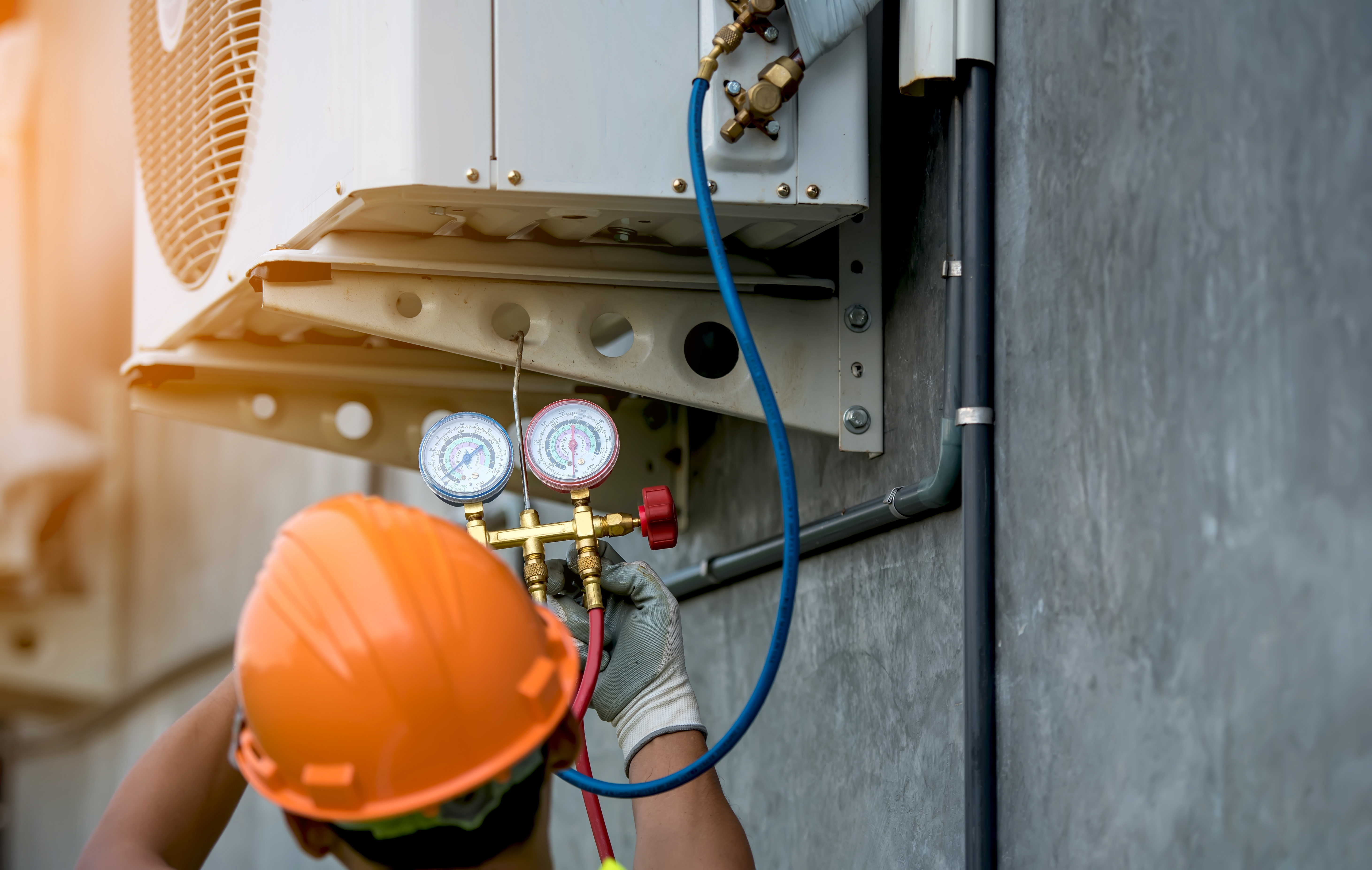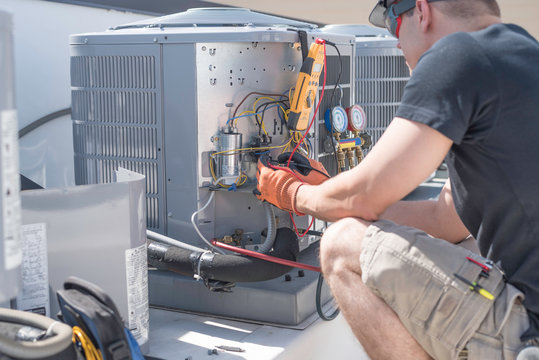The ultimate guide to ac unit replacement for homeowners
Wiki Article
All Concerning A/c: Identifying Common Issues and Effective A/c Repair Service Techniques
Heating and cooling systems are vital for preserving indoor convenience. Recognizing their elements and performance is important for identifying usual concerns. House owners typically face problems such as inadequate air conditioning, unusual smells, or climbing power expenses. These signs can show underlying problems that may need attention. Discovering DIY troubleshooting techniques can be valuable, however knowing when to look for expert help is just as essential. What actions can be required to guarantee durable performance?Recognizing Your A/c System: Components and Capability
An a/c system, frequently thought about the backbone of interior environment control, contains a number of essential parts that interact to control temperature and air high quality. The primary aspects consist of the heating device, ventilation system, and a/c device. The heating device, generally a heater or boiler, creates warmth throughout cooler months, while the air conditioning system cools down indoor areas throughout the summer.
Common A/c Problems Home Owners Encounter
Home owners commonly face numerous common cooling and heating problems, consisting of inconsistent temperature level distribution throughout their living areas. Additionally, uncommon sounds during procedure can indicate underlying concerns that need focus. Dealing with these problems quickly is essential for preserving excellent system performance.Irregular Temperature Distribution
Several homes experience the discouraging issue of inconsistent temperature level circulation, where specific areas feel uncomfortably cozy while others continue to be too cold. This problem frequently develops from a range of variables, including poor insulation, blocked vents, or a poorly sized HVAC system. When ducts are not sufficiently secured or when furnishings blocks airflow, some rooms may get inadequate air conditioning. In addition, thermostat positioning can substantially influence temperature level regulation; a thermostat located in a sunlit area may misrepresent the overall temperature of the residence. Normal maintenance, including cleaning filters and making sure ductwork is clear, can aid alleviate these discrepancies. Property owners may also consider zoning systems to better control temperatures throughout different locations of the home, advertising an extra comfy living atmosphere.Unusual Noises During Operation
When a heating and cooling system operates, uncommon sounds can show underlying problems that need attention. Property owners may encounter a series of audios, such as grinding, squealing, or hissing. Grinding noises frequently signal damaged bearings or parts, while squeaking can suggest loose belts or parts requiring lubrication. Hissing might suggest a refrigerant leakage, which can jeopardize the system's effectiveness. Additionally, banging audios might indicate loosened ductwork or an issue with the blower follower. Each of these noises acts as a caution, triggering property owners to investigate better. Neglecting these signs can bring about even more significant troubles and expensive repairs. Normal maintenance and punctual focus to unusual sounds can improve system longevity and efficiency, ensuring a comfy living atmosphere.Indicators That Indicate Your A/c Needs Repair Service
How can one inform if their air conditioning system needs repair service? Several indications may suggest underlying concerns needing specialist attention. If the Air conditioner fails to cool the room efficiently, it might suggest a refrigerant leakage or compressor malfunction. In addition, an increase in energy expenses without matching usage changes might signify inefficiency in the system. House owners ought to additionally look out to unusual smells originating from the device, which can show mold and mildew growth or electrical concerns. If the A/c regularly cycles on and off, it could be a sign of a faulty thermostat or other mechanical problems. The visibility of water merging around the system can suggest a stopped up drainpipe line. Identifying these indications early can conserve money and time, ensuring that the cooling system runs successfully and properly.Do It Yourself Troubleshooting Techniques for Cooling And Heating Issues
When encountering cooling and heating concerns, home owners can use numerous do it yourself fixing techniques to identify the trouble. Trick techniques include checking thermostat settings, evaluating air filters, and reviewing water drainage problems. These steps can aid determine typical malfunctions prior to looking for expert assistance.Inspecting Thermostat Setups
What actions should house owners take to assure their thermostat setups are appropriate? They need to validate the thermostat is set to the desired temperature and setting, whether heating or cooling. Examining for a clear screen and confirming the thermostat is not established to "hold" or "vacation" mode is essential. Homeowners must also validate that the thermostat is level and mounted in a place free from drafts, direct sunshine, or other temperature level influences. In addition, recalibrating the thermostat can aid offer exact readings. If the thermostat runs on batteries, changing them look at this site may settle any type of concerns. By systematically examining these variables, property owners can often identify and remedy thermostat-related troubles, promoting suitable HVAC system performance.Inspecting Air Filters
he saidAir filters play an essential role in preserving ideal heating and cooling efficiency. They catch dirt, allergens, and other bits, making certain tidy air circulation. In time, filters can come to be blocked, minimizing air movement and performance. To inspect air filters, individuals ought to initially find the filter, usually found in the return duct or near the heater. As soon as situated, they need to evaluate the filter's condition-- if it appears dirty or stained, it likely requirements replacement. A lot of filters call for changing every 1-3 months, depending upon usage and environmental elements. Routine evaluation and timely replacement of air filters not only enhance air quality but also prolong the life-span of HVAC systems, preventing prospective breakdowns and pricey fixings.
Assessing Drain Issues
Exactly how can house owners efficiently identify and address drainage concerns within their HVAC systems? Initially, they should examine the condensate drain line for clogs or obstructions, which can cause water accumulation. Property owners might use a wet/dry vacuum to remove any kind of debris obstructing the line. Next, examining the drainpipe pan for rust or leaks is important, as a harmed pan can create water to overflow. Normal cleansing of the drain line with a blend of vinegar and water assists avoid future clogs. Additionally, making certain appropriate incline of the drain line advertises efficient water flow. If these do it yourself strategies do not settle the problem, seeking advice from an expert heating and cooling professional may be essential to prevent possible water damage and system failing.When to Call an Expert for Air Conditioning Repair Services

While some air conditioning concerns can be dealt with with do it yourself techniques, there are circumstances where calling an expert becomes crucial. House owners ought to seek experienced support when they come across relentless problems, such as inadequate air conditioning, unusual noises, or uncommon smells emanating from the system. These symptoms may suggest deeper problems that call for specialized knowledge and devices to detect and repair correctly.

Preventative Upkeep Tips for Heating And Cooling Durability
heating and furnace repairRegular preventative maintenance can substantially boost the durability of HVAC systems. House owners need to set up annual inspections by qualified professionals to examine system efficiency and identify possible problems. Routinely transforming or cleaning air filters is vital, as this warranties correct air movement and minimizes strain on the system. In enhancement, checking and sealing ductwork stops power loss and boosts general performance.
It is additionally recommended to maintain the outside system free from particles and plants, enabling peak air flow and warm exchange. House owners must check the condensate drain for blockages to avoid water damage and mold and mildew growth. Keeping ideal thermostat setups and making use of programmable choices can boost energy efficiency. Finally, recording maintenance activities assists track solution background and can aid in recognizing reoccuring concerns (HVAC company). By adhering to these preventative procedures, individuals can maximize the effectiveness and lifespan of their cooling and heating systems
Often Asked Concerns
How Often Should I Replace My HVAC System Filters?
Cooling and heating system filters ought to generally be changed every one to three months, depending upon usage, filter kind, and environmental factors. Regular substitute assists keep performance and air top quality, making sure peak system efficiency throughout the year.What Dimension HVAC System Do I Need for My Home?
To figure out the proper cooling and heating system size for a home, one have to think about square footage, insulation quality, and regional environment. Consulting a specialist can help ensure maximum effectiveness and convenience for the specific living space.Exist Eco-Friendly Heating And Cooling Options Available?
Yes, environment-friendly a/c alternatives are available, consisting of energy-efficient heatpump, solar-powered systems, and geothermal heating. These alternatives lower energy usage and ecological effect, advertising sustainability while preserving efficient climate control for residential and industrial areas.Exactly How Can I Improve My a/c System's Energy Efficiency?
To improve a/c power performance, one can frequently maintain the system, seal air leakages, mount programmable thermostats, make use of energy-efficient filters, and warranty sufficient insulation throughout the home to decrease power consumption and improve efficiency.
What Is the Typical Life-span of a HVAC System?
The ordinary life expectancy of a HVAC system normally varies from 15 to 25 years, depending upon factors such as upkeep, use, and the high quality of installment. Regular upkeep can substantially expand its functional durability.Conclusion
In summary, an extensive understanding of a/c systems encourages house owners to determine typical problems and address small troubles successfully. Acknowledging signs of breakdown, using DIY repairing techniques, and prioritizing routine maintenance can boost system efficiency and efficiency. Nonetheless, when confronted with intricate repairs, getting expert aid is critical to ensure safety and durability. By promoting awareness and proactive treatment, individuals can take pleasure in a comfortable interior setting while reducing unanticipated prices connected with a/c failings.Report this wiki page